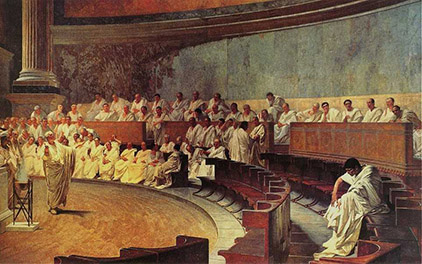CLU22202 Culture and Ideology in the Ancient World

This module explores the beliefs, values and aspirations which underpin the political, economic, religious and private life in an ancient city state that ruled an empire – democratic Athens in the 5th century BCE or the Roman republic in the time of Cicero – as emerging from its literature and other cultural manifestations. You will learn what it meant to be an Athenian or Roman citizen in a time of political and intellectual crisis, learn how identities were constructed, maintained, and manipulated, and assess how cultural claims informed political ambitions. You will explore aspects of individual and collective self-representation, and competing views of the relation between public and private, mass and elite, human and divine, and Athenian/Roman assertions of cultural and military hegemony.
- Module Organiser:
- Dr Martine Cuypers, Prof. Monica Gale, Dr Hannah Mitchell
- Duration:
- Semester 2
- Contact Hours:
- 17 (12 lectures, 5 seminars)
- Weighting:
- 5 ECTS
- Assessment:
- 100% coursework
- Course Open To:
- Classics, Ancient History and Archaeology; TJH Classical Civilisation; Columbia Dual Degree; Ancient and Medieval History and Culture; Visiting; Open Module
CLU22204 Culture and Ideology in the Ancient World with Project
This 10-ECTS version of the module includes a substantial element of independent research on a topic to be agreed with the module coordinator.
Learning Outcomes
On successful conclusion of this module, students should be able to:
- Recognise the myths, beliefs, values and aspirations that were central to individual and collective identities in Classical Athens or Republican Rome
- Explore how these identities and values were constructed, corroborated and manipulated in political, economic, religious, literary, cultural and private life
- Analyse relevant textual and/or visual evidence with consideration of its literary, intellectual, social and historical contexts
- Evaluate and apply recent critical approaches to Athenian or Roman identity and ideology
- Discuss how key parameters of Athenian or Roman politics relate to modern political systems and phenomena such as imperialism, colonisation, migration and globalisation
- Articulate evidence-based views both orally and in writing

